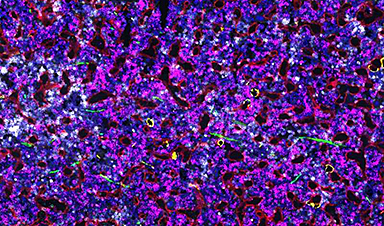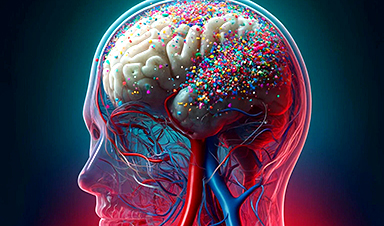Is the coronavirus on its way out?
You might think so. New, updated booster shots are being rolled out to better protect against the variants circulating now. The U.S. Centers for Disease Control and Prevention has dropped COVID-19 quarantine and distancing recommendations. And more people have thrown off their masks and returned to pre-pandemic activities.
But scientists say no. They predict the scourge that’s already lasted longer than the 1918 flu pandemic will linger far into the future.
One reason it’s lasted this long? It’s gotten better and better at getting around immunity from vaccination and past infection. Scientists point to emerging research that suggests the latest omicron variant gaining ground in the U.S. — BA.4.6, which was responsible for around 8% of new U.S. infections last week — appears to be even better at evading the immune system than the dominant BA.5.
Scientists worry the virus may well keep evolving in worrisome ways.
How long will it be around?
White House COVID-19 coordinator Dr. Ashish Jha said COVID-19 will likely be with us for the rest of our lives.
Experts expect COVID-19 will someday become endemic, meaning it occurs regularly in certain areas according to established patterns. But they don’t think that will be very soon.
Still, living with COVID “should not necessarily be a scary or bad concept,” since people are getting better at fighting it, Jha said during a recent question-and-answer session with U.S. Sen. Bernie Sanders of Vermont. “Obviously if we take our foot off the gas — if we stop updating our vaccines, we stop getting new treatments — then we could slip backwards.”
Experts say COVID will keep causing serious illness in some people. The COVID-19 Scenario Modeling Hub made some pandemic projections spanning August 2022 to May 2023, assuming the new tweaked boosters adding protection for the newest omicron relatives would be available and a booster campaign would take place in fall and winter. In the most pessimistic scenario — a new variant and late boosters — they projected 1.3 million hospitalizations and 181,000 deaths during that period. In the most optimistic scenario — no new variant and early boosters — they projected a little more than half the number of hospitalizations and 111,000 deaths.
Eric Topol, head of Scripps Research Translational Institute, said the world is likely to keep seeing repetitive surges until “we do the things we have to do,” such as developing next generation vaccines and rolling them out equitably.
Topol said the virus “just has too many ways to work around our current strategies, and it’ll just keep finding people, finding them again, and self-perpetuating.”
How will the virus mutate?
Scientists expect more genetic changes that affect parts of the spike protein studding the surface of the virus, letting it attach to human cells.
But the virus probably won’t keep getting more transmissible forever.
“I think there is a limit,” said Matthew Binnicker, director of clinical virology at Mayo Clinic in Rochester, Minnesota. “What we’re really dealing with, though, is there’s still a lot of people across the world who don’t have any prior immunity — either they haven’t been infected or they haven’t had access to vaccination.”
If humanity’s baseline level of immunity rises significantly, he said, the rate of infections, and with that emergence of more contagious variants, should slow down.
But there is a chance the virus could mutate in a way that causes more severe illness.
“There’s not any inherent reason, biologically, that the virus has to become milder over time,” said Dr. Wesley Long, a pathologist at Houston Methodist. The fact it may seem milder now “is likely just the combined effect of all of us having some immune history with the virus.”
While scientists hope that continues, they also point out that immunity gradually wanes.
Will the next variant be another version of Omnicron?
Omicron has been around since late last year, with a series of super transmissible versions quickly displacing one another, and Binnicker believes “that will continue at least for the next few months.”
But down the road, he said it’s likely a new variant distinct from omicron will pop up.
The recent wave of infections and re-infections, he said, “gives the virus more chances to spread and mutate and new variants to emerge.”
Can people influence the future of the virus?
Yes, experts said. One way is to get vaccinated and boosted.
“We have a virus out there that’s still circulating, still killing hundreds of Americans every day,” Jha said in a press briefing Tuesday. But, he added: “We now have all of the capability to prevent, I believe, essentially all of those deaths. If people stay up to date on their vaccines, if people get treated if they have a breakthrough infection, we can make deaths from this virus vanishingly rare.”
Not only does vaccination protect against severe disease and death, it raises the level of immunity globally.
CDC director Rochelle Walensky said Tuesday that up to 100,000 COVID-19 hospitalizations and 9,000 deaths could be prevented if Americans get the updated booster at the same rate they typically get an annual flu shot this fall. About half of Americans are typically vaccinated against the flu each year.
People can also keep protecting themselves by taking other precautions like, for example, wearing masks indoors when COVID rates are high.
Longtime nurse Catherine Mirabile said it’s important not to dismiss the dangers of the coronavirus — which sickened her twice, nearly killed her husband and left them both with long COVID. Daily deaths still average around 450 in the U.S.
“People really need to look at this and still take this seriously,” said the 62-year-old from Princeton, West Virginia, who is now on disability. “They could end up in the same shape we’re in.”
News
Scientists Invent Plastic That Can Dissolve In Seawater In Just A Few Hours
Plastic waste and pollution in the sea have been among the most serious environmental problems for decades, causing immense damage to marine life and ecosystems. However, a breakthrough discovery may offer a game-changing solution. [...]
Muscles from the 3D printer
Swiss researchers have developed a method for printing artificial muscles out of silicone. In the future, these could be used on both humans and robots. Swiss researchers have succeeded in printing artificial muscles out [...]
Beneficial genetic changes observed in regular blood donors
Researchers at the Francis Crick Institute have identified genetic changes in blood stem cells from frequent blood donors that support the production of new, non-cancerous cells. Understanding the differences in the mutations that accumulate [...]
Shocking Amounts of Microplastics in the Brain – It Could Be Increasing Our Risk of Dementia
The brain has higher concentrations of plastic particles compared to other organs, with increased levels found in dementia patients. In a comprehensive commentary published in Brain Medicine, researchers highlight alarming new evidence of microplastic accumulation [...]
Baffling Scientists for Centuries: New Study Unravels Mystery of Static Electricity
ISTA physicists demonstrate that contact electrification depends on the contact history of materials. For centuries, static electricity has intrigued and perplexed scientists. Now, researchers from the Waitukaitis group at the Institute of Science and [...]
Tumor “Stickiness” – Scientists Develop Potential New Way To Predict Cancer’s Spread
UC San Diego researchers have developed a device that predicts breast cancer aggressiveness by measuring tumor cell adhesion. Weakly adherent cells indicate a higher risk of metastasis, especially in early-stage DCIS. This innovation could [...]
Scientists Just Watched Atoms Move for the First Time Using AI
Scientists have developed a groundbreaking AI-driven technique that reveals the hidden movements of nanoparticles, essential in materials science, pharmaceuticals, and electronics. By integrating artificial intelligence with electron microscopy, researchers can now visualize atomic-level changes that were [...]
Scientists Sound Alarm: “Safe” Antibiotic Has Led to an Almost Untreatable Superbug
A recent study reveals that an antibiotic used for liver disease patients may increase their risk of contracting a dangerous superbug. An international team of researchers has discovered that rifaximin, a commonly prescribed antibiotic [...]
Scientists Discover Natural Compound That Stops Cancer Progression
A discovery led by OHSU was made possible by years of study conducted by University of Portland undergraduates. Scientists have discovered a natural compound that can halt a key process involved in the progression [...]
Scientists Just Discovered an RNA That Repairs DNA Damage – And It’s a Game-Changer
Our DNA is constantly under threat — from cell division errors to external factors like sunlight and smoking. Fortunately, cells have intricate repair mechanisms to counteract this damage. Scientists have uncovered a surprising role played by [...]
What Scientists Just Discovered About COVID-19’s Hidden Death Toll
COVID-19 didn’t just claim lives directly—it reshaped mortality patterns worldwide. A major international study found that life expectancy plummeted across most of the 24 analyzed countries, with additional deaths from cardiovascular disease, substance abuse, and mental [...]
Self-Propelled Nanoparticles Improve Immunotherapy for Non-Invasive Bladder Cancer
A study led by Pohang University of Science and Technology (POSTECH) and the Institute for Bioengineering of Catalonia (IBEC) in South Korea details the creation of urea-powered nanomotors that enhance immunotherapy for bladder cancer. The nanomotors [...]
Scientists Develop New System That Produces Drinking Water From Thin Air
UT Austin researchers have developed a biodegradable, biomass-based hydrogel that efficiently extracts drinkable water from the air, offering a scalable, sustainable solution for water access in off-grid communities, emergency relief, and agriculture. Discarded food [...]
AI Unveils Hidden Nanoparticles – A Breakthrough in Early Disease Detection
Deep Nanometry (DNM) is an innovative technique combining high-speed optical detection with AI-driven noise reduction, allowing researchers to find rare nanoparticles like extracellular vesicles (EVs). Since EVs play a role in disease detection, DNM [...]
Inhalable nanoparticles could help treat chronic lung disease
Nanoparticles designed to release antibiotics deep inside the lungs reduced inflammation and improved lung function in mice with symptoms of chronic obstructive pulmonary disease By Grace Wade Delivering medication to the lungs with inhalable nanoparticles [...]
New MRI Study Uncovers Hidden Lung Abnormalities in Children With Long COVID
Long COVID is more than just lingering symptoms—it may have a hidden biological basis that standard medical tests fail to detect. A groundbreaking study using advanced MRI technology has uncovered significant lung abnormalities in [...]






















